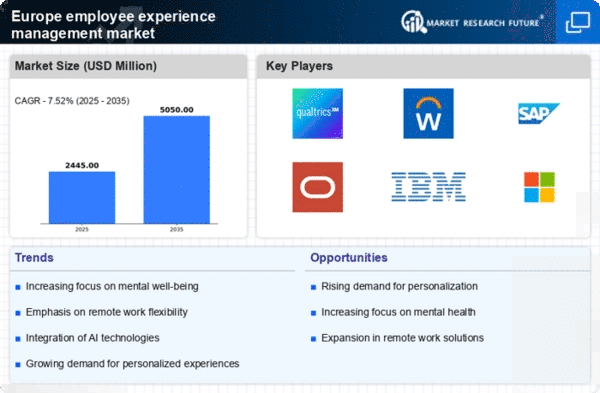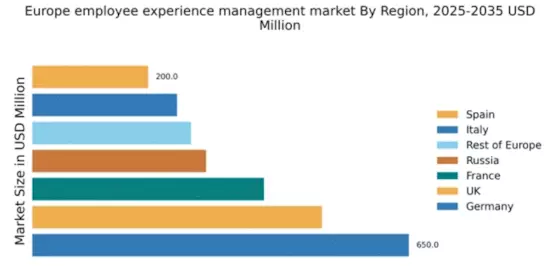Adoption of Data-Driven Decision Making
The employee experience-management market is experiencing a shift towards data-driven decision making. Organizations are increasingly leveraging analytics to gain insights into employee behavior, preferences, and performance. This trend is supported by the fact that companies utilizing data analytics in their HR strategies report a 30% improvement in employee engagement. By harnessing data, organizations can tailor their employee experience-management initiatives to better meet the needs of their workforce. This analytical approach not only enhances decision-making processes but also fosters a culture of transparency and accountability, which is essential for driving employee satisfaction and retention.
Rising Demand for Flexible Work Arrangements
The employee experience-management market in Europe is witnessing a notable shift towards flexible work arrangements. Organizations are increasingly recognizing the importance of work-life balance, which appears to enhance employee satisfaction and retention. According to recent data, approximately 70% of employees in Europe express a preference for hybrid work models. This trend is likely to drive investments in employee experience-management solutions that facilitate remote collaboration and communication. Companies that adapt to these preferences may experience a competitive advantage, as they can attract top talent and reduce turnover rates. The rising demand for flexibility is thus a critical driver in shaping the employee experience-management market, compelling organizations to innovate and implement strategies that cater to diverse employee needs.
Focus on Mental Health and Wellness Initiatives
The employee experience-management market is increasingly driven by a focus on mental health and wellness initiatives. Organizations are recognizing the critical role that mental well-being plays in overall employee performance and satisfaction. Recent surveys reveal that nearly 60% of employees in Europe prioritize mental health support from their employers. This growing awareness is prompting companies to implement comprehensive wellness programs, which may include counseling services, stress management workshops, and wellness apps. As a result, the demand for employee experience-management solutions that integrate mental health resources is likely to rise, reflecting a broader commitment to fostering a supportive work environment.
Growing Importance of Employee Feedback Mechanisms
In the employee experience-management market, the emphasis on robust feedback mechanisms is becoming increasingly pronounced. Organizations are recognizing that continuous feedback is essential for fostering a positive workplace culture. Recent studies indicate that companies utilizing regular feedback tools see a 15% increase in employee engagement levels. This trend suggests that organizations are investing in platforms that facilitate real-time feedback and performance evaluations. By prioritizing employee input, companies can better understand their workforce's needs and preferences, leading to improved job satisfaction and productivity. Consequently, the growing importance of feedback mechanisms is a significant driver influencing the evolution of the employee experience-management market in Europe.
Increased Investment in Employee Training and Development
The employee experience-management market in Europe is significantly influenced by the rising investment in employee training and development programs. Organizations are increasingly aware that continuous learning opportunities are vital for employee retention and satisfaction. Data shows that companies that invest in employee development experience a 24% higher retention rate. This trend indicates a shift towards creating a culture of learning, where employees feel valued and empowered to grow within their roles. As organizations allocate more resources to training initiatives, the demand for employee experience-management solutions that support these programs is likely to increase, thereby shaping the market landscape.

















